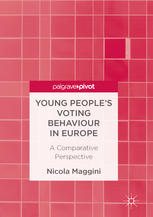Comparative Politics
-

Disponibile online il dataset sulla volatilità elettorale nelle elezioni europee dal 1979
Siamo lieti di annunciare la pubblicazione del dataset sulla volatilità elettorale…
-

Cleavages, Institutions and Competition
Emanuele, V. (2018), ‘Cleavages, institutions, and competition. Understanding vote nationalization in…
-

Young People’s Voting Behaviour in Europe. A Comparative Perspective
Nicola Maggini Young People’s Voting Behaviour in Europe. A Comparative Perspective…